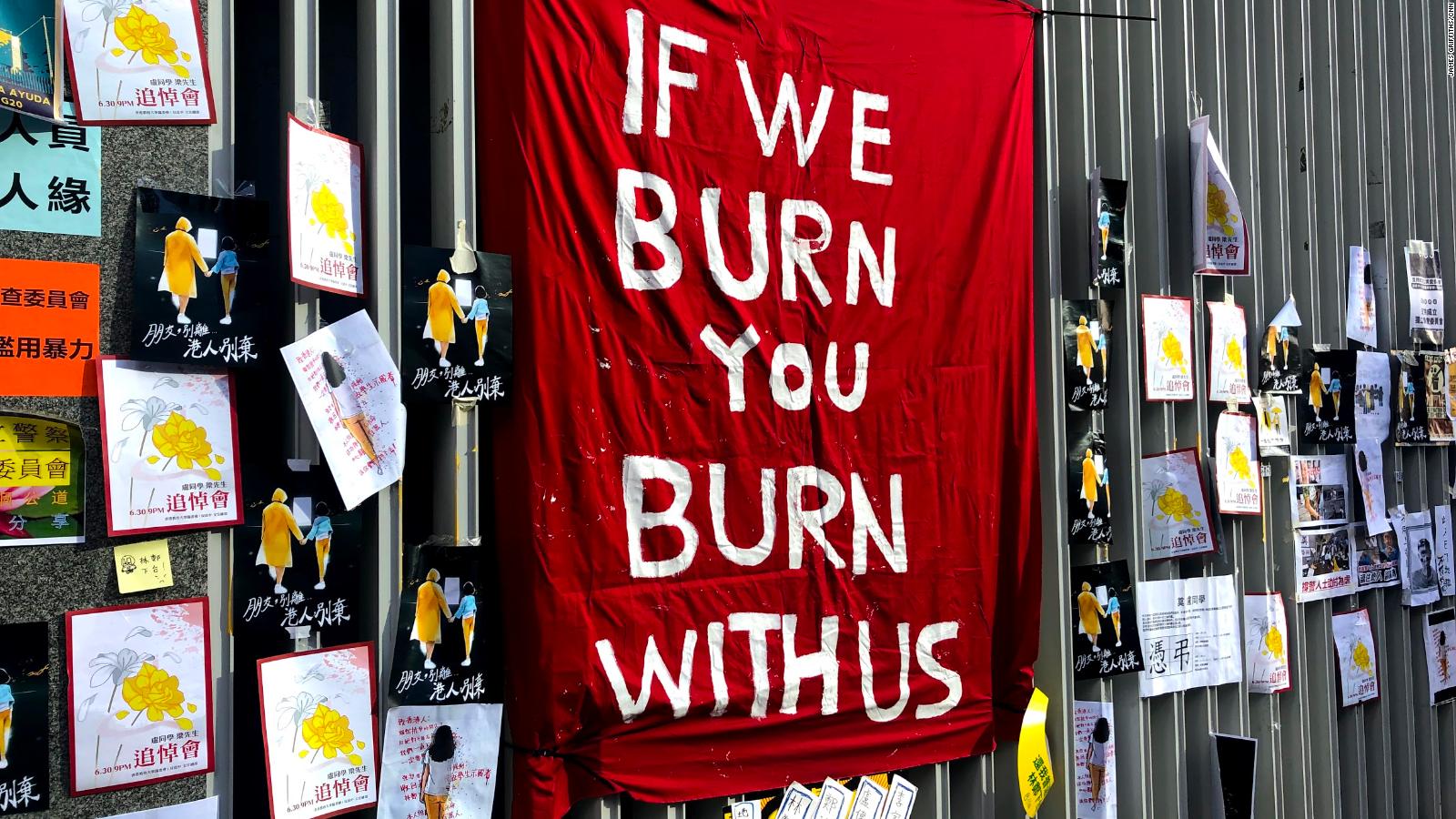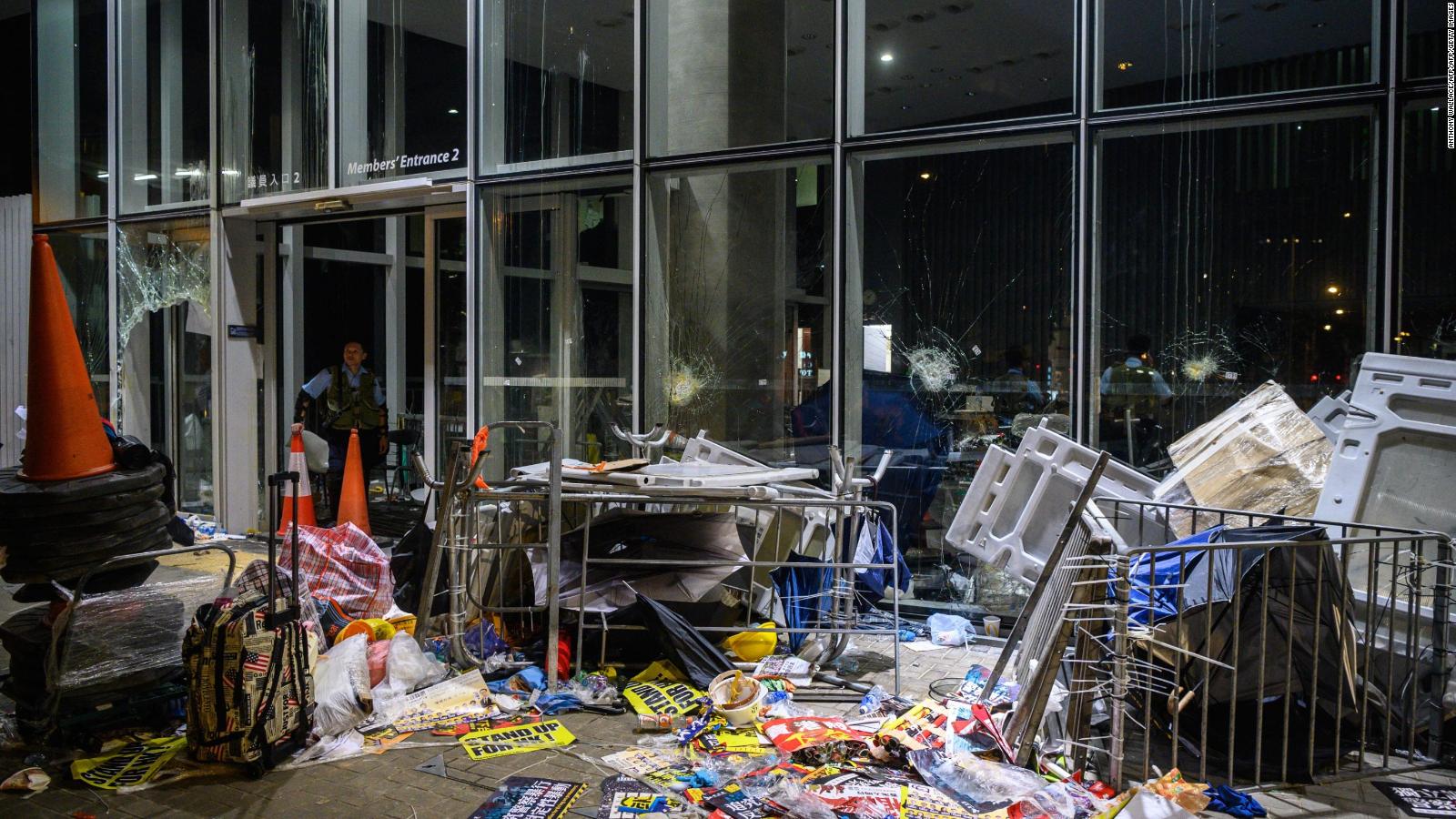It encapsulated the feeling of the protest and how far the mood has shifted since the optimism of the 2014 Umbrella Movement, when Hong Kong protesters were lauded worldwide for being peaceful and respectful. During those protests, there was a real sense that true change was possible, that the city's long demand of democracy was on the verge of being met.
When the Umbrella Movement failed, things began to turn.
Two years later, protesters clashed violently with police over an attempt to crack down on an open-air food market, in what became known as the "Mong Kok fish ball riot." The government responded with a barrage of prosecutions and ejected several pro-democracy lawmakers from the legislature.
Last month, a bill that would allow extradition to China galvanized opposition from a wide swath of society and uncorked the anger and frustration that has been bubbling under the surface since 2014.
For weeks, hundreds of thousands of people have marched against the bill, leading to it being shelved though not formally withdrawn, while smaller -- but still substantial -- protests have clashed with police. Tear gas and rubber bullets were used to clear a major occupation on June 12, leading to allegations of police brutality and even angrier protests, several of which targeted the police headquarters and blocked officers inside.
A growing divide in the protest camp became clear Monday, as a peaceful pro-democracy march passed by the legislature where a splinter group of protesters was clashing with police and attempting to break in to the government headquarters.
With police nowhere in sight, the anger among the breakaway protest group exploded, as the mostly young, masked protesters smashed windows of the government building, forced their way inside through metal shutters and then trashed nearly everything in sight, including the legislative chamber.
"We hope the government will listen to the people," a masked protester said inside the chamber. "Return power to the people. This city, Hong Kong, belongs to her seven million citizens."
While protesters beat a tactical retreat late Monday -- some were forcibly carried out by fellow demonstrators who wanted to stay out of the building -- they promised they would return if their demands were not met.
Desperation and destruction
Watching the chaos inside the legislature Monday were several grim-faced, pro-democracy lawmakers, who had earlier attempted to stop protesters storming the building, only to be shouted down and blamed for their previous failure to block the extradition bill.
"This is really not what we like to see," said pro-democracy Labour Party lawmaker Fernando Cheung.
He blamed the violence on the "lack of positive response to the public" after weeks of demonstrations and noted that Chief Executive Carrie Lam had refused to meet with opposition lawmakers ahead of Monday's protests.
"Lam has been hiding away for weeks, not even facing the media," he said. "In the meantime, we have had three young people who took their lives in desperation ... that really made young people desperate. They feel the lives of these comrades have been taken by the regime and they feel like they have some responsibility."
Images of three people whose suicides have been linked to the protests were everywhere Monday, and protesters have made them martyrs, often ignoring warnings about suicide contagion by doing so.
The mood among many protesters at the government headquarters -- all of whom wore masks but appeared to be in their mid-to-late teens and early twenties -- was often bleak.
"Hong Kong is not China yet," read one slogan spray painted inside the legislature, while another said: "There are no rioters, only a tyranny."
The fear for many is that the territory is turning into just another Chinese city. They worry that time is running out to shore up democratic reforms and political freedoms before the handover agreement that the British struck in 1997 expires in 2047 and Hong Kong truly becomes part of China.
Cheung, and the older pro-democrats, aren't in charge of channeling this fear and activism, nor are the generation of student leaders who came to prominence during the Umbrella Movement. Joshua Wong, released from prison at the height of protests last month, tried and failed to take some degree of control, but protesters have preferred to remain leaderless and fluid, adopting Bruce Lee's slogan: "Be like water."
While there are advantages to a leaderless model -- not least that there aren't obvious targets for prison sentences -- there are risks, too. With no one in charge, angry protests can quickly escalate without a plan for what comes next, as many protesters admitted was the case yesterday.
Changing mood
Being a young Hong Konger isn't easy. Housing prices and living costs rise each year, while youth employment rates have been largely stagnant and many young graduates struggle to find work.
The younger generation also lacks many of the reasons for optimism that previous ones did. Many older Hong Kongers, who grew up in a British colony, strongly identify with China and saw a point of pride in the city returning to Chinese rule, even pro-democrats. Today, the number of people who express pride in being a Chinese citizen is at a record low, with a significant number of young people identifying as Hong Kongers rather than Chinese, according to the Hong Kong University Public Opinion Program.
This stronger sense of identity with the city and opposition to China, has created a generation of protesters for whom this really is an all or nothing fight. Their ties are not to country, but to city and each other, as seen when protesters returned to the legislature minutes before the police clearance to drag out some who wanted to stay and face the consequences, determined that all would share the same fate.
And if they're doomed to lose, many now appear intent on doing so with a fight.
"If we burn, you burn with us."
Bagikan Berita Ini

















0 Response to "Hong Kong's democracy movement was about hope. These protests are driven by desperation"
Post a Comment